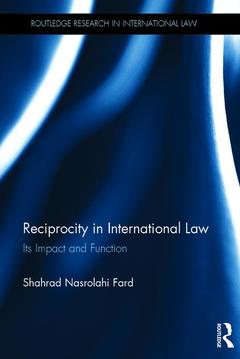Reciprocity in International Law Its impact and function Routledge Research in International Law Series
Auteur : Fard Shahrad Nasrolahi

In international relations, reciprocity describes an environment in which States support one another for short- or long-term advantage through the balancing of rights, duties and interests. This book examines reciprocity in the context of international law. It considers the role reciprocity plays in the creation and development of international law as well as in the interpretation and application of international law. The book illuminates the reciprocal framework of international law and international relations by examining the role reciprocity plays in different types of States? obligations, including bilateral, bilateralisable multilateral, non-bilateralisable multilateral and obligations erga omnes. The book examines how reciprocity is intertwined with the principle of equality, as the rights and obligations of States are equal irrespective of size and economic or military strength, and the beneficial effects of reciprocity in creating stability and cooperation amongst States.
1. Introduction 2.What is Reciprocity? 3. Reciprocity and the Sources of International Law 4. Reciprocity and the Rule of Law 5. Reciprocity and Enforcement Mechanisms of International Law 6. Reciprocity and International Cooperation 7. Final Remarks
Shahrad Nasrolahi Fard holds a PhD in Public International Law from the University of Aberystwyth.
Date de parution : 12-2015
15.6x23.4 cm
Disponible chez l'éditeur (délai d'approvisionnement : 14 jours).
Prix indicatif 172,36 €
Ajouter au panierDate de parution : 06-2018
15.6x23.4 cm
Disponible chez l'éditeur (délai d'approvisionnement : 14 jours).
Prix indicatif 53,83 €
Ajouter au panierThèmes de Reciprocity in International Law :
Mots-clés :
icj; report; commission; cornell; journal; harvard; statute; american; sociological; review; International Law; ICJ’s Ruling; International Humanitarian Law; Public International Law; North Sea Continental Shelf Cases; Jus Cogens Rules; Takie Sugiyama Lebra; Obligations Erga Omnes; International Law Commission; Opinio Juris; Law Review; WTO Dispute Settlement; Customary International Law; IRI; Dispute Settlement Body; Anglo-Iranian Oil Company Case; Anglo-Norwegian Fisheries Case; Positive Reciprocity; Mohammed Bedjaoui; Geneva Convention Relative; European Journal; Akehurst’s Modern Introduction; Hugh Thirlway; Trial Judgment; Ken Booth



